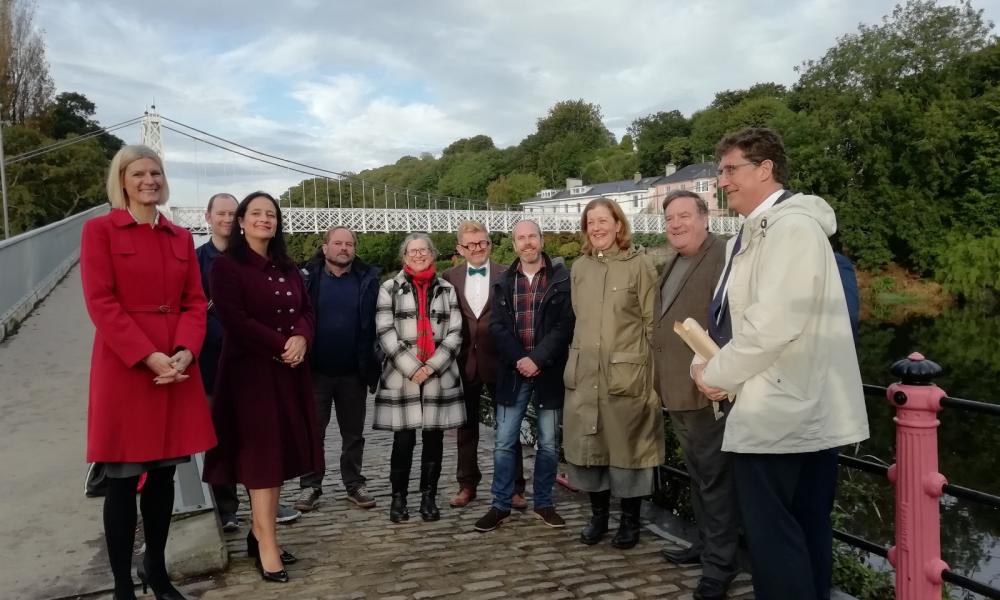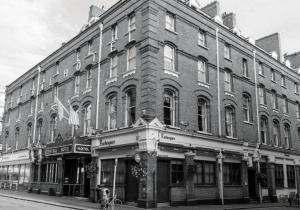Cork leads the way in the climate rebellion

The Rebel County is turning green this weekend as party activists from all over the island will gather for the Green Party Annual Convention. Hundreds of party members will assemble to decide party policy and prepare for the forthcoming European and local elections.
The party will run a strong team of candidates across the city and county, including in areas where it has not competed for many years. Green Party candidates are deeply involved in community action across the county, from Rory Jackson in Skibbereen highlighting gorse fires and marine pollution, Harriet Burgess in Macroom calling for a National Park at Gearagh, and Cliona O’Halloran in Cobh, and Clodagh Harrington in Midleton, lobbying for increased public transport.
It is fitting that the Convention is taking place in Cork City, which has been selected to be one of Europe’s first climate neutral cities. The city will lead the way in drastically cutting down greenhouse gas emissions and taking climate action for a just transition to climate neutrality.
Cork is currently undergoing its largest ever investment in expanding the rail network. The Cork Area Commuter Rail will spend €78.5m to treble the number of trains running between Cork and Cobh, Midleton and Mallow. There will be six new train stations and ninety new train carriages to be put in use across Cork. This will ensure the delivery of a more efficient, sustainable, low-carbon and climate-resilient, heavy rail network for the Cork region.
Minister Eamon Ryan said;
“The rebel county is leading the way as a green city and a green county. Just a quick walk around the city centre shows how much things are changing, with the two-way cycle track along the South Mall and the almost finished MacCurtain Street Public Transport Scheme, which will improve walking, cycling and public transport, supporting businesses and making access to the historic city centre from the northside easier. Plans for Cork City’s light rail system are progressing well and bus services across the county are taking off. Since 2022, six new or enhanced bus routes have been put into operation, linking renowned towns like Allihies and Kilcrohan or Mallow and Charleville with more frequent and reliable services. Cork is definitely turning from red to green, for the better.”
Cork is also leading the way in providing skills for building and maintaining homes in a sustainable manner. A new retrofitting skills centre was opened in Bishopstown this year that will train 1,500 people annually. It comes as the number of workers enrolled in retrofitting schemes has increased fivefold since 2020. This is a major advance in creating new green jobs and is an important step towards halving Ireland’s carbon emissions by 2030.
Councillor for Cork City South-West Colette Finn said;
“The Green Party is having a major impact in the transport sector with hundreds of kilometres of cycle facilities built by 2025. We've also pedestrianised 17 streets and started to show people how much more pleasant it is for shopping and going for a meal without traffic congestion. It has not been all plain sailing, but we have started the conversation about multi-modal transport and offering people alternatives to the private car. We've also raised awareness around biodiversity and appreciating our locality. Cork as a green city is a work in progress but we are starting to protect and expand our green spaces.”
Another innovative environmental initiative is the BRIDE Project (Biodiversity Regeneration In a Dairying Environment) based in the River Bride catchment of north-east County Cork. The Project aims to design and implement a results-based approach to conserve, enhance and restore habitats in lowland intensive farmland. This combined, community-based effort is an entirely new approach to environmental management compared to the randomised process of selection in previous agri-environment schemes.
Green Party candidate for Bandon-Kinsale, Marc Ó Riain said;
“Covid illustrated to the residents of Kinsale and Bandon that pedestrianisation was key to them enjoying their town. We campaigned for a greater amount of pedestrianisation in Kinsale and achieved the pedestrianisation of Short Quay. Traffic calming and active travel measures such as wider foot paths, pedestrian crossings and new bus stops have improved active travel in Belgooly.
“There is an increased demand for bus services and we have succeeded in expanding bus services such as the double-decker bus on the 226 routes and a new 228 service from Kinsale via the universities to the city. We continue to campaign for greater level of re-wilding of our green areas, a greater number of pedestrian connections from schools to residential areas, the introduction of public recycle bins, new public toilets and the return of Pipers funfair.”
A wide range of projects have received support to boost the arts and culture of Cork, such as funding for the redevelopment of Crawford Art Gallery and the Cork on a Fork Festival, which celebrates Cork food and Cork city’s ever evolving dining and nightlife scene.
Cork is one of the cities chosen for the pilot scheme of the Night-time economy to develop a vibrant and diverse night economy. It will engage with the community, businesses, venues and artists to implement plans that make sense for the city. The pilot projects follow announcements on the reform of the licencing laws that will allow pubs to stay open to open to 12.30am and nightclubs until 6am.


